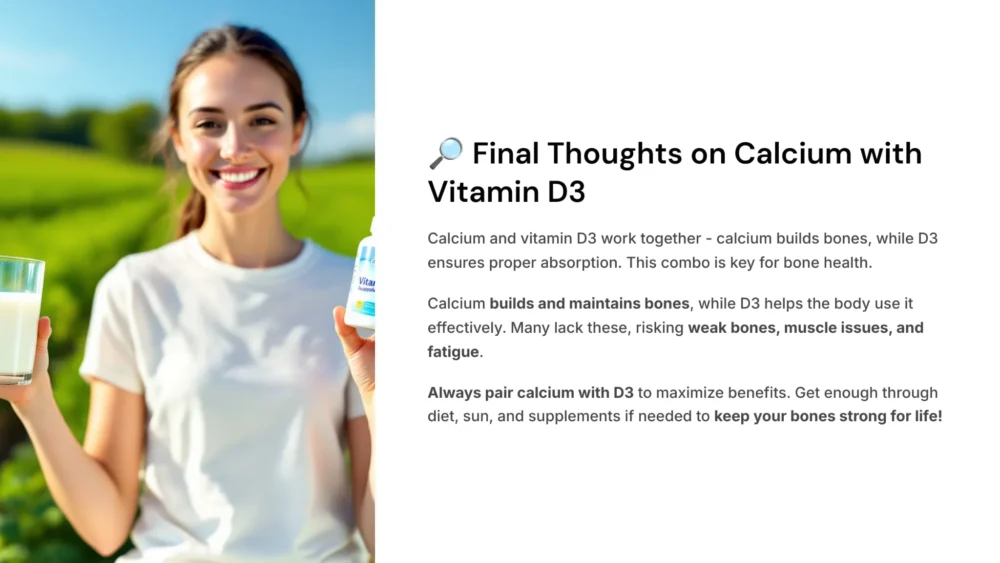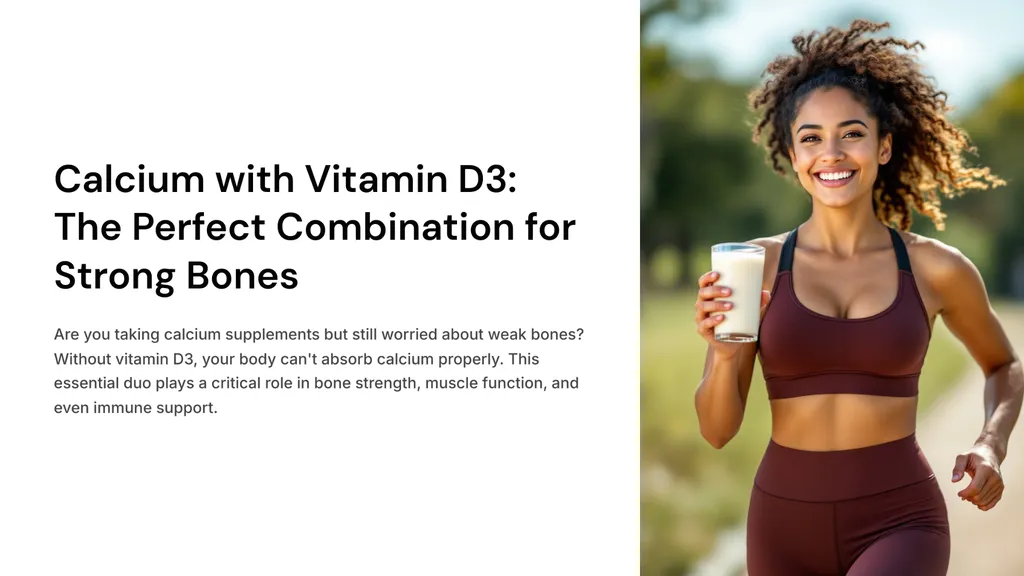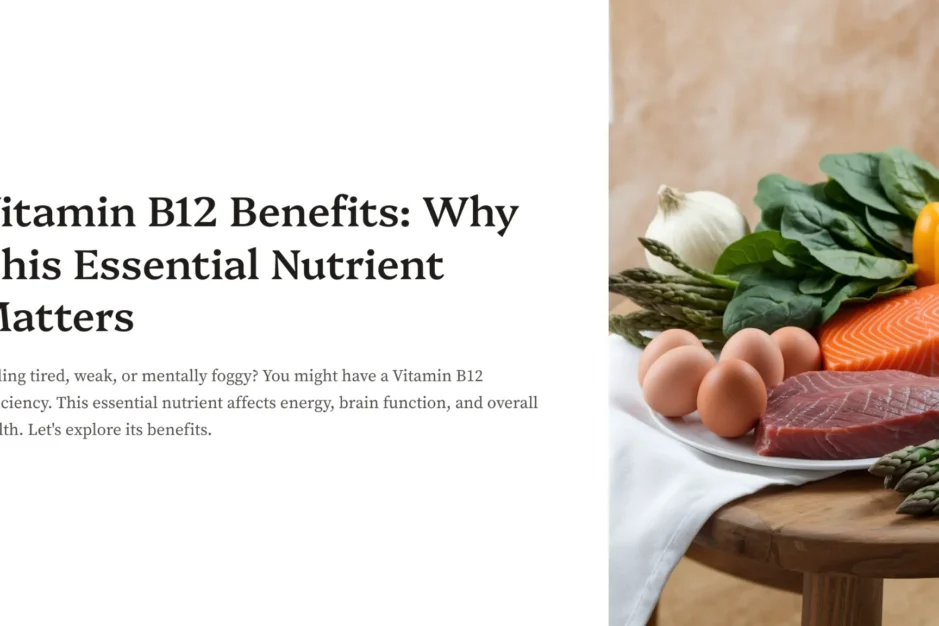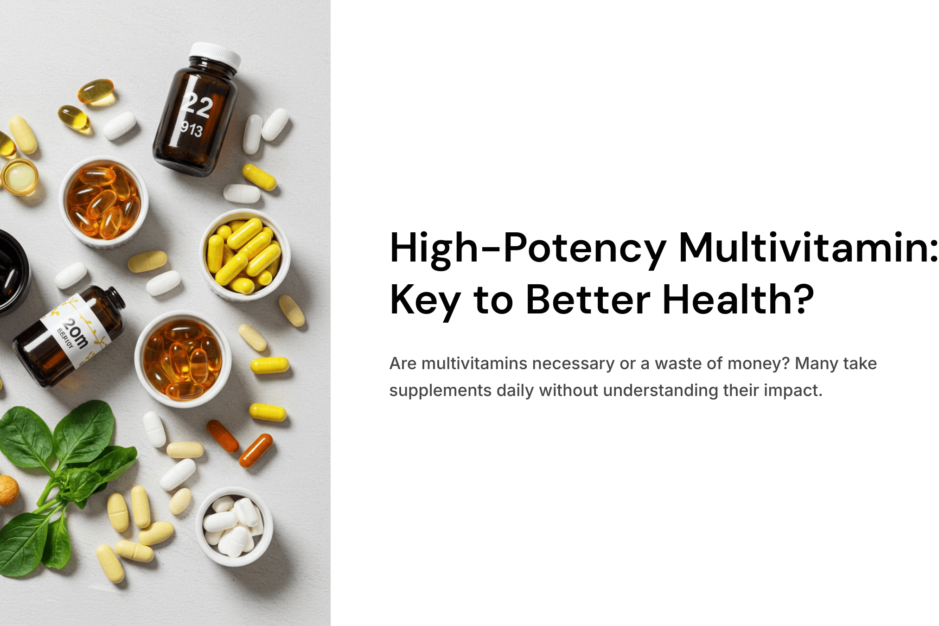Calcium with Vitamin D3: The Perfect Combination for Strong Bones
Are you taking calcium supplements but still worried about weak bones? Without vitamin D3, your body can’t absorb calcium properly. This essential duo plays a critical role in bone strength, muscle function, and even immune support.
📋 Contents
- 🦴 Calcium with Vitamin D3: Why Your Body Needs Both
- 🌞 How Vitamin D3 Helps Your Body Absorb Calcium
- 💊 Choosing the Best Calcium with Vitamin D3 Supplements
- 🍊 Best Food Sources of Calcium and Vitamin D3
- ❓ Do I Need a Supplement?
- 🚫 Common Myths About Calcium and Vitamin D3
- ❓ FAQ about Calcium with Vitamin D3
Why Calcium with Vitamin D3 Matters
Our bones are constantly being broken down and rebuilt. To maintain strong bones, your body needs a steady supply of calcium. However, calcium alone isn’t enough. Without vitamin D3, your body struggles to absorb calcium efficiently.
Many people unknowingly suffer from calcium or vitamin D3 deficiency. This can lead to:
- 📉 Weak bones that increase the risk of fractures.
- 💪 Muscle cramps and overall weakness.
- 🦷 Tooth decay and dental problems.
- 😴 Fatigue and low energy levels.
By ensuring you get enough calcium with vitamin D3, you can support bone density, prevent osteoporosis, and improve overall health.
💎 Key Point:
Taking calcium without vitamin D3 is like trying to build a house without cement—it won’t hold up in the long run.
In this guide, we’ll explore why you need calcium with vitamin D3, the best dietary sources, and whether a supplement is necessary for you. Let’s get started!
🦴 Calcium with Vitamin D3: Why Your Body Needs Both
Calcium is the primary mineral that builds and maintains strong bones, but without vitamin D3, your body struggles to absorb and utilize it properly. This combination is essential for bone density, muscle function, and even cardiovascular health.
⚖️ The Role of Calcium in Bone Health
Calcium is stored in the bones and teeth, making up nearly 99% of your body’s calcium supply. It helps maintain bone density and strength, reducing the risk of osteoporosis and fractures.
🌞 Why Vitamin D3 is the Key to Calcium Absorption
Vitamin D3 acts as a transport system for calcium. It helps the intestines absorb calcium from food and directs it to where it’s needed most—your bones.
💡 TIP: If you’re getting plenty of calcium but still have weak bones, a vitamin D3 deficiency might be the cause.
🌞 How Vitamin D3 Helps Your Body Absorb Calcium
Vitamin D3 plays a critical role in regulating calcium levels. Without enough vitamin D3, calcium absorption can drop by up to 50%, leaving bones weak and brittle.
☀️ Sunlight: The Natural Source of Vitamin D3
Your body naturally produces vitamin D3 when exposed to sunlight. However, modern lifestyles and environmental factors often limit sun exposure, leading to deficiencies.
🛑 Risk Factors for Vitamin D3 Deficiency
You may be at risk if you:
- 🌥️ Live in areas with limited sunlight.
- 🏠 Spend most of your time indoors.
- 🧴 Use sunscreen frequently (which blocks vitamin D production).
- 🍽️ Follow a strict vegan diet (since most vitamin D3 sources are animal-based).
⚠️ WARNING: Chronic vitamin D3 deficiency can lead to rickets (soft bones in children) and osteoporosis in adults.
💊 Choosing the Best Calcium with Vitamin D3 Supplements
If you struggle to get enough calcium or vitamin D3 from food, supplements can help bridge the gap. However, not all supplements are created equal.
🦷 What to Look for in a Good Calcium with Vitamin D3 Supplement
- ✅ Calcium type: Look for calcium citrate (better absorption) or calcium carbonate (higher calcium content).
- ✅ Vitamin D3 dosage: At least 600-800 IU per day for adults.
- ✅ Added magnesium & vitamin K2: These help calcium reach your bones instead of accumulating in arteries.
⚖️ How Much Calcium with Vitamin D3 Do You Need?
The recommended daily intake varies by age:
| Age Group | Calcium (mg/day) | Vitamin D3 (IU/day) |
|---|---|---|
| Children (4-8 years) | 1000 mg | 600 IU |
| Teens (9-18 years) | 1300 mg | 600 IU |
| Adults (19-50 years) | 1000 mg | 600 IU |
| Women 50+ / Men 70+ | 1200 mg | 800 IU |
💡 TIP: Too much calcium without enough vitamin D3 can lead to kidney stones and poor absorption.
🍊 Best Food Sources of Calcium and Vitamin D3
While supplements can help, the best way to get calcium with vitamin D3 is through a balanced diet. Many natural foods contain these essential nutrients in the right amounts.
🥛 Top Calcium-Rich Foods
Calcium is found in a variety of foods, not just dairy. Here are some of the best sources:
- 🧀 Dairy products: Milk, cheese, and yogurt are among the richest sources.
- 🥬 Leafy greens: Kale, spinach, and bok choy contain plant-based calcium.
- 🌰 Nuts and seeds: Almonds and sesame seeds provide calcium and healthy fats.
- 🐟 Canned fish with bones: Sardines and salmon are excellent calcium sources.
- 🌾 Fortified foods: Some cereals, orange juice, and plant-based milks are enriched with calcium.
☀️ Best Food Sources of Vitamin D3
Since vitamin D3 is naturally produced in response to sunlight, food sources are limited. However, you can still get it from:
- 🐟 Fatty fish: Salmon, mackerel, and tuna provide high amounts of vitamin D3.
- 🍳 Egg yolks: A good source, though in smaller amounts.
- 🧈 Butter and cheese: Contain trace amounts of vitamin D3.
- 🥛 Fortified dairy and plant-based milks: Many brands add vitamin D3.
- 🍊 Fortified orange juice: A good option for those who don’t consume dairy.
💡 TIP: If you don’t eat dairy, be sure to include fortified foods or supplements in your diet.
❓ Do I Need a Supplement?
Not everyone needs a calcium and vitamin D3 supplement. If you get enough from your diet and sun exposure, you may not need extra support. However, some people are at risk of deficiency.
🛑 Who Should Consider a Supplement?
You may need a supplement if you:
- 🚶♂️ Have limited sun exposure (live in cold climates, work indoors).
- 🥦 Follow a vegan or dairy-free diet.
- 👵 Are over 50 (bone density naturally declines with age).
- ⚕️ Have conditions like osteoporosis or calcium malabsorption.
💊 How to Choose the Right Supplement
Look for supplements that:
- ✅ Contain both calcium and vitamin D3 in the recommended dosages.
- ✅ Use calcium citrate (for better absorption) or calcium carbonate (for higher calcium content).
- ✅ Include magnesium and vitamin K2 to support calcium absorption.
⚠️ WARNING: Taking too much calcium without enough vitamin D3 can lead to poor absorption and kidney stones.
🚫 Common Myths About Calcium and Vitamin D3
There is a lot of misinformation surrounding calcium and vitamin D3. Let’s separate fact from fiction.
❌ Myth #1: “You Only Need Calcium for Strong Bones”
Many people believe that simply taking calcium is enough for bone health. However, without vitamin D3, your body can’t absorb and use calcium efficiently. Both nutrients are needed together to maintain strong bones.
❌ Myth #2: “You Can Get Enough Vitamin D3 from Food Alone”
While some foods contain vitamin D3, the majority of vitamin D3 comes from sunlight. If you spend most of your time indoors, you may need a supplement.
❌ Myth #3: “The More Calcium You Take, The Stronger Your Bones”
Taking excess calcium (without enough vitamin D3) can lead to calcium buildup in the kidneys, increasing the risk of kidney stones. Balance is key.
❌ Myth #4: “Vitamin D2 is the Same as Vitamin D3”
Vitamin D2 (found in some plant sources) is not as effective as vitamin D3. The body absorbs and utilizes vitamin D3 more efficiently, making it the preferred form.
⚠️ WARNING: Be cautious of high-dose calcium supplements without vitamin D3—they may do more harm than good.
🔎 Final Thoughts on Calcium with Vitamin D3
Calcium with vitamin D3 is the perfect combination for strong bones, proper muscle function, and overall health. While calcium builds and maintains bones, vitamin D3 ensures it is absorbed and used effectively by the body.
Many people unknowingly suffer from calcium or vitamin D3 deficiency, increasing the risk of osteoporosis, weak bones, muscle cramps, and fatigue. By consuming calcium-rich foods, getting enough sunlight, and supplementing if necessary, you can protect your bones and maintain overall health.
💎 Key Point:
Taking calcium alone isn’t enough—always pair it with vitamin D3 to maximize its benefits!
❓ FAQ about Calcium with Vitamin D3
🦴 Why is calcium with vitamin D3 important?
Calcium is essential for strong bones and teeth, but your body can’t absorb it efficiently without vitamin D3. Together, they help prevent osteoporosis, fractures, and muscle weakness.
🌞 How much vitamin D3 do I need to absorb calcium properly?
The recommended daily intake of vitamin D3 varies by age:
- Children (1-18 years): 600 IU
- Adults under 70: 600 IU
- Adults over 70: 800 IU
- People with deficiency: 1000-4000 IU (consult a doctor)
Getting enough sunlight and eating vitamin D3-rich foods can help maintain healthy levels.
💊 What is the best form of calcium to take with vitamin D3?
Calcium comes in different forms, but the best types for absorption are:
- Calcium citrate: Absorbed well with or without food, great for older adults.
- Calcium carbonate: Best taken with food, contains more elemental calcium.
- Calcium lactate & gluconate: Less common but also effective.
🚫 Can too much calcium with vitamin D3 be harmful?
Yes. Excess calcium intake can lead to kidney stones, heart problems, and digestive issues. It’s best to stay within the daily recommended limits:
- Adults 19-50: 1000 mg calcium
- Women over 50 & men over 70: 1200 mg calcium
- Upper safe limit: 2500 mg per day
🥦 Can I get enough calcium and vitamin D3 from food alone?
Yes! Some of the best dietary sources include:
| Food | Calcium Content | Vitamin D3 Content |
|---|---|---|
| Milk (1 cup) | 300 mg | 100 IU |
| Salmon (100g) | 10 mg | 570 IU |
| Cheese (30g) | 200 mg | 12 IU |
| Fortified orange juice (1 cup) | 350 mg | 100 IU |
| Egg yolk (1 large) | 25 mg | 40 IU |
| Spinach (1 cup cooked) | 250 mg | — |
If your diet lacks these foods, a supplement might be necessary.
🩺 Who should take calcium with vitamin D3 supplements?
Some groups of people are at higher risk of calcium or vitamin D3 deficiency, including:
- Postmenopausal women: Higher risk of osteoporosis.
- People with limited sun exposure: May have low vitamin D3 levels.
- Vegans and lactose-intolerant individuals: May not get enough calcium from food.
- Older adults: Reduced calcium absorption with age.
🕒 When is the best time to take calcium with vitamin D3?
For optimal absorption:
- Calcium carbonate: Take with meals for better digestion.
- Calcium citrate: Can be taken with or without food.
- Vitamin D3: Best taken in the morning with a meal containing fat.
🔎 Final Thoughts on Calcium with Vitamin D3
Calcium with vitamin D3 is the perfect combination for strong bones, proper muscle function, and overall health. While calcium builds and maintains bones, vitamin D3 ensures it is absorbed and used effectively by the body.
Many people unknowingly suffer from calcium or vitamin D3 deficiency, increasing the risk of osteoporosis, weak bones, muscle cramps, and fatigue. By consuming calcium-rich foods, getting enough sunlight, and supplementing if necessary, you can protect your bones and maintain overall health.
💎 Key Point:
Taking calcium alone isn’t enough—always pair it with vitamin D3 to maximize its benefits!
If you’re unsure whether you’re getting enough calcium with vitamin D3, talk to a doctor or nutritionist to determine your needs. A balanced diet, regular sun exposure, and supplements when needed can help keep your bones strong for life!

For an age-specific guide on Vitamin D, check out the following articles:
Baby, Kids, Adults.



